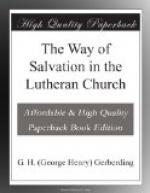As we have already said, the plain sense of the words of this passage is, that the bread is a connection with, or a participation in Christ’s body, and so with the wine; so much so that whoever partakes of the one must, in some manner, also become a partaker of the other. The bread, therefore, becomes the medium, the vehicle, the conveyance, that carries to the communicant the body of Christ, and the wine likewise His blood. And this, we repeat, without any gross material transmutation or mixing together. The bread and wine are the earthen vessels that carry the Heavenly treasures of Christ’s body and blood, even as the letters and words of the Scriptures convey to the reader or hearer the Holy Spirit. This is the clear, plain, Bible doctrine of the Lord’s Supper. There is nothing gross, carnal, Capernaitish or repulsive about it.
And exactly this is the teaching and doctrine of the Evangelical Lutheran Church. Article X., Augsburg Confession, says, “Of the Lord’s Supper they teach that the true body and blood of Christ are truly present, under the form of bread and wine, and are there communicated to those that eat in the Lord’s Supper.” And Luther’s Catechism says, “The sacrament of the altar is the true body and blood of Jesus Christ, under the bread and wine, given unto us Christians to eat and drink, as it was instituted by Christ Himself.”
We therefore find that on this point also our dear old Church is built impregnably on the foundation of Christ and His Apostles. And though she may here differ from all others, she cannot yield one jot or tittle without proving false to her Lord and His truth. It is not bigotry. It is not prejudice, that makes her cling so tenaciously to this doctrine. She knows, as the great Reformer knew, that the very foundations are at stake; that if she gives up on this point, and changes the Scriptures to suit human reason, she will soon have to give up other doctrines, and by and by the rock on which the Church is built will be removed, and the gates of hell will prevail.
And further, if there is any risk of being mistaken—which she, however, does not admit—she would rather run that risk, by taking her Master at His word, than by changing His word. In childlike confidence and trust, she would rather believe too much than not enough. She would rather trust her dear Master too far than not far enough. And therefore here she stands; she cannot do otherwise. May God help her! Amen.
Others may still say, “This is a hard saying, who can bear it? The idea of eating and drinking the body and blood of our Lord offends us.”
Well, it also offended the late Henry Ward Beecher, that his salvation should depend on the literal shedding of the literal blood of Jesus. This idea was repulsive to the great Brooklyn divine. But it does not offend us. On the contrary, this same doctrine is to us the very heart of the whole Gospel, and is therefore more precious than life itself.




